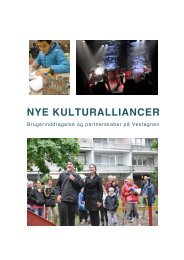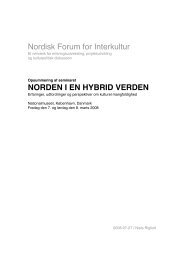Forestillingens fællesskab [PDF] - Center for Kunst & Interkultur
Forestillingens fællesskab [PDF] - Center for Kunst & Interkultur
Forestillingens fællesskab [PDF] - Center for Kunst & Interkultur
You also want an ePaper? Increase the reach of your titles
YUMPU automatically turns print PDFs into web optimized ePapers that Google loves.
Abstract<br />
In Denmark there is an ongoing debate about missing representation of cultural diversity<br />
within the arts and culture sector. This thesis, called The theatre’s imagined community,<br />
takes its point of departure within this debate, investigating interviews about a concrete<br />
theatre play called: Et andet Sted (‘Somewhere else’) which was staged at the theater<br />
Mungo Park in 2010. We have chosen this specific play as it represents an example of<br />
repertoire renewal compared to the traditional West-European plays that are criticised in<br />
the debate. What is new about the play is the fact that it tells a part of Danish history from<br />
a Turkish immigrant perspective. Our investigation deals with the actual representational<br />
space within the theatre as well as how cultural diversity manifests itself during the<br />
interviews. There<strong>for</strong>e this thesis is not an esthetic analysis of the play; rather we focus on<br />
interviews with members of the production crew, actors and audience in connection to<br />
the play. In order to do this, we find it extremely relevant to define how cultural diversity<br />
can be understood, and in so doing we come up with different theoretical components<br />
which we can use when interpreting and discussing our different interviews. Mikhail<br />
Bakhtin and Homi K. Bhabha are the dominant figures in this definition. Bakhtin is<br />
useful because of the way he places the carnival as a carnevalesque counter-culture to<br />
the surrounding society. Furthermore the concept of ”the dialogical” is all-pervading<br />
in the sense that different people negotiate meanings in dialogue as well as one person<br />
negotiates with him-/herself about conceptions of the world. Bhabhas idea of ‘the third<br />
space’ and processes of cultural hybridity that take <strong>for</strong>m within the frame of the national,<br />
are likewise crucial. Both theorists are motivated by the ambivalence connected to the<br />
processes they discuss. In this connection we find it appealing to ask whether there is a<br />
possibility that a collocation of a dialogical third space can be institutionalized within the<br />
theatre’s representational space.With our theoretical perspective as well as the composition<br />
of different interviews, the debate and our own observations, we investigate how the<br />
representational space has taken <strong>for</strong>m in the process of planning the whole play, how<br />
this space of negotiation functions in practice and what potential the theatre experience<br />
has in terms of communicating intercultural insight. Conclusively we can say that the<br />
theatre gives room <strong>for</strong> a sense of community across cultural diversity. Its representational<br />
space allows a counter-perspective on the surrounding society within which people with<br />
different cultural imaginations can negotiate meanings. In this sense a challenging seed<br />
has been planted both in the debate around the arts and culture sector as well as in the<br />
imagination of Danish national community.<br />
6


![Forestillingens fællesskab [PDF] - Center for Kunst & Interkultur](https://img.yumpu.com/18358981/6/500x640/forestillingens-faellesskab-pdf-center-for-kunst-amp-interkultur.jpg)
![Charter for kulturel mangfoldighed [PDF] - Center for Kunst ...](https://img.yumpu.com/20120874/1/184x260/charter-for-kulturel-mangfoldighed-pdf-center-for-kunst-.jpg?quality=85)
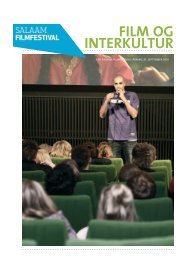
!['Publikum og interkultur' [PDF, 76 sider] - Center for Kunst & Interkultur](https://img.yumpu.com/18489645/1/190x238/publikum-og-interkultur-pdf-76-sider-center-for-kunst-interkultur.jpg?quality=85)
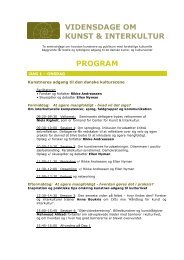

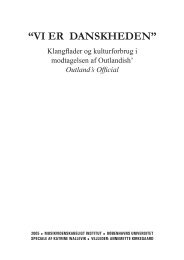
!['Perkere og andet godtfolk' [PDF] - Center for Kunst & Interkultur](https://img.yumpu.com/18334249/1/184x260/perkere-og-andet-godtfolk-pdf-center-for-kunst-interkultur.jpg?quality=85)
